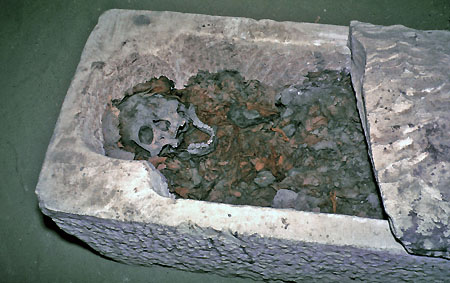![]()
What you must do in this unit
- Review chapter 1, which you have already read, and then read chapter 2 in the textbook.
- Read Gilgamesh (the whole book).
- Read my notes on the Ancient Near East.
- Check out Professor Campbell's video Was Ancient Paganism B.S.?
- Check out Professor Campbell's video Was Ancient Slavery B.S.?
- Study the Questions to Consider and the Key Terms for the Unit.
- Submit the Gilgamesh paper (100 points).
What you can do in this unit
- Check out my online exhibit on Egyptian religion.
- Please read the Sample Historical Document Analysis, based on some excerpts from Hammurabi's code of law. The sample illustrates some of the questions that a historian asks when reading a historical document. This is what you will be doing in this course.
- Listen to some further information about this unit as a mp3 file. You can also read the information as a txt file.
- Review my notes and remarks on the Ancient Hebrews and the development of the idea of ethical monotheism.
- Repatriation: who legally owns artifacts discovered and/or excavated from sites around the world?
- Plan ahead. Take a look at some of the available optional special project assignments in unit 14. These are additional extra credit options in the course.
- Often within the course, you will find an extra credit option to answer study questions on the unit's reading (see below for the link to the Gilgamesh study questions). Your answers to study questions should not be simple yes/no answers, but they should be thorough answers. Here is a link to an example of outstanding study question answers done by one of the students in HIS 112. Please notice the completeness of each answer.
Some videos that you can watch for this unit
- BBC - Building the Great Pyramid - 1 of 6
- What The Ancients Did For Us - The Mesopotamians Part 1/6
- The Rosetta Stone
- Law Code Stele of King Hammurabi
- Mesopotamia: Crash Course World History #3
- Ancient Egypt: Crash Course World History #4
- See the PBS video, "Rise of the Black Pharaohs," on the Kushite kingdom.
- For extra credit please suggest to your instructor a relevant video for this unit of the course. Send the title of the video, the URL and a brief explanation of why you find the video interesting and applicable to the material that is being studied in this unit.
Extra Credit Options
- For up to 25 points of extra credit, write a one-page paper (maybe two pages if they are exceptional) that provides a detailed comparison of Gilgamesh and Genesis. (You may wish to read more of Genesis for your comparison.)
- For up to 10 points of extra credit, read Hammurabi's Code of Laws and write a paragraph explaining the social structure of Ancient Babylon.
- For up to 10 points of extra credit, read The Precepts of Ptah-Hotep, c. 2200 BCE, and write a paragraph explaining Ptah-Hotep's understanding of how to live one's life.
- For up to 10 points of extra credit, read the Genesis excerpt and write a paragraph answering this question, Did Genesis describe an ethical religion, i.e. a religion that required an individual to follow a code of moral behavior?
- For up to 5 points of extra credit, answer the Genesis study sheet questions
- For up to 5 points of extra credit, submit the answers to the Gilgamesh study questions. Please write in formal, complete sentences.
- For extra credit, please suggest a relevant website for this unit of the course. Send your instructor the title of the site, the URL and a brief explanation why you find the information interesting and applicable to the material being studied this unit.
Unit Learning Objectives
- Upon successful completion of this unit, you will be able to (1) describe the foundation and growth of Egyptian and Mesopotamian societies and (2) analyze a historical primary source.
